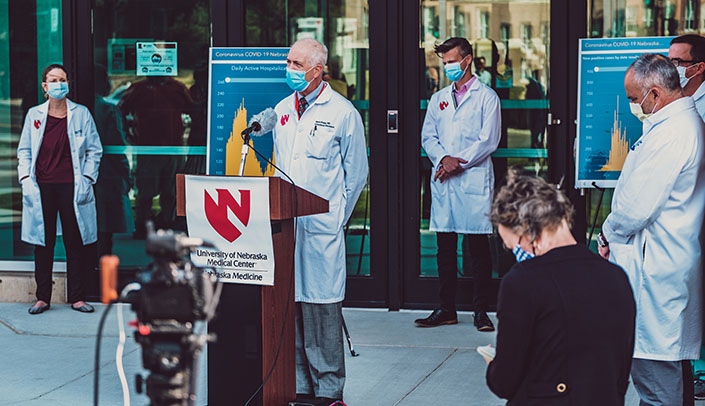A group a physicians and scientists from UNMC and Nebraska Medicine — including James Lawler, MD, John Lowe, PhD, Angela Hewlett, MD, Daniel Johnson, MD, Mark Rupp, MD, and Jana Broadhurst, MD, PhD —
released the following statement Monday afternoon at a news conference.
We are entering a dangerous period for our state in the course of the COVID-19 pandemic. The largest surge of cases and hospitalizations we have seen is currently upon us. We know how to beat this virus, but we’ve gotten complacent. COVID-19 has now killed nearly 500 Nebraskans, and many more are likely to die if we don’t take more action immediately. Nebraskans have a long history of helping our neighbors to work through the most difficult tragedies — floods, ice storms, tornadoes and droughts. We need to find that spirit of community now more than ever to overcome COVID-19.
We can’t emphasize this enough: COVID-19 isn’t a political or ideological issue. Our advice is the same regardless of political leadership at any level:
- Wear a face covering in public
- Avoid large gatherings and close contact indoors
- Maintain at least six feet distance from others in public
- Practice good hand hygiene
- Stay home and call your doctor if you are ill
- Quarantine at home if you have close contact with someone with COVID-19
- Cooperate with public health in tracking exposures and illness
Our daily counts of COVID-19 cases and hospitalizations are now equal to our May peak and rising rapidly. However, we continue to relax social distancing measures and fully open schools, all while cooler weather begins to drive activities indoors and the annual flu season looms. To absorb the increasing load of patients, Nebraska is relying on hospitals that are currently more than 85% full, which is a very different scenario than in April and May, when hospitals were 50% full. It is a potential perfect storm.
Early in the pandemic, Nebraska took sensible and strong actions to mitigate COVID-19 spread, and we reaped the results of those actions by having one of the lowest fatality rates of any state. We built a solid structure of community protection, but like the game of Jenga, we steadily have removed block after block of that tower: lifting limitations of occupancy inside restaurants, opening bars, allowing large gatherings and opening schools at full student density. As the structure weakens, our case counts accelerate. Now, some communities are considering rolling back the use of face masks. Remove that block, and the entire structure may collapse.
We understand everyone has pandemic fatigue — we do, also. But we are hearing too many COVID patient stories that start with, “I went to a party” or “I visited extended family, but everyone seemed well.” You’ve seen it on your Facebook feeds — a dozen friends eating dinner in a small indoor space with no masks in sight. This is the perfect environment for COVID-19 to continue to spread, which threatens the lives of our most vulnerable neighbors and family members. We can’t let down our guard.
Finally, the COVID-19 response isn’t an all-or-nothing proposition. Many states and countries have shown it is possible to suppress spread without going into complete lock-down. We can strike an effective balance. Now is clearly not the time to relax restrictions, but by following the precautions mentioned above, we can weather the storm this fall and winter and still while supporting our economy and overall community well-being. Together, we can emerge in the spring to a vaccine and a clearer road back to normal.

Thank you all for your clear statement about what needs to be done in Nebraska and Omaha to prevent COVID-19 illness and deaths. I only hope that political leaders take this seriously.
Thanks for speaking out!
This all makes sense, but when a country’s leader is still in denial mode and refuses to wear a mask this virus will prevail.
I don't understand why we don't start people on medication as soon as someone has a positive test, that's what they did with the President. Why tell people to just quarantine & wait until they can't breath to put them on medication & provide treatment? Too many times that's too late.